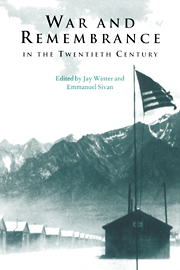Book contents
- Frontmatter
- Contents
- Preface
- Introduction
- 1 Setting the framework
- 2 Forms of kinship and remembrance in the aftermath of the Great War
- 3 War, death, and remembrance in Soviet Russia
- 4 Agents of memory: Spanish Civil War veterans and disabled soldiers
- 5 Children as war victims in postwar European cinema
- 6 From survivor to witness: voices from the Shoah
- 7 Landscapes of loss and remembrance: the case of Little Tokyo in Los Angeles
- 8 The Algerian War in French collective memory
- 9 Private pain and public remembrance in Israel
- 10 Personal narratives and commemoration
- 11 Against consolation: Walter Benjamin and the refusal to mourn
- Index
- Studies in the Social and Cultural History of Modern Warfare
6 - From survivor to witness: voices from the Shoah
Published online by Cambridge University Press: 27 October 2009
- Frontmatter
- Contents
- Preface
- Introduction
- 1 Setting the framework
- 2 Forms of kinship and remembrance in the aftermath of the Great War
- 3 War, death, and remembrance in Soviet Russia
- 4 Agents of memory: Spanish Civil War veterans and disabled soldiers
- 5 Children as war victims in postwar European cinema
- 6 From survivor to witness: voices from the Shoah
- 7 Landscapes of loss and remembrance: the case of Little Tokyo in Los Angeles
- 8 The Algerian War in French collective memory
- 9 Private pain and public remembrance in Israel
- 10 Personal narratives and commemoration
- 11 Against consolation: Walter Benjamin and the refusal to mourn
- Index
- Studies in the Social and Cultural History of Modern Warfare
Summary
‘Good people, do not forget, good people, tell the story, good people, write!’ declared the renowned historian Simon Dubnov to his companions before his death on 8 December 1941 in Riga, killed by a Lithuanian policeman during the liquidation of the ghetto. It was the last appeal of an old man. This story may be apocryphal. But Dubnov was not alone among those who, during the Holocaust, as well as throughout the fifty years following the destruction of the Jews of Europe, tried to tell the story because to do so was an act of duty, the duty to remember.
We thus have at our disposal today a mass of testimony – perhaps in volume greater than that related to any other historical event. No single scholar can master it all: books, newspapers, audio and video recordings, alongside evidence produced privately or for personal reasons. Some are part of legal proceedings; others are pedagogic in character, related to visits of survivors or their relatives to schools. There are large-scale inquiries, frequently originating in efforts to establish a data base or oral archive.
This kind of testimony stands at the intersection of the individual and society. It affirms that every individual, every single life, each experience of the Shoah was irreducible and unique. But this affirmation is in the language of the time in which the evidence is registered, necessarily creating multiple voices in the chorus of witnesses of genocide.
- Type
- Chapter
- Information
- War and Remembrance in the Twentieth Century , pp. 125 - 141Publisher: Cambridge University PressPrint publication year: 1999
- 6
- Cited by



